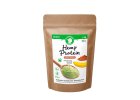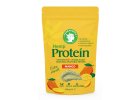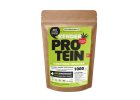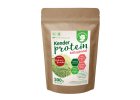Hemp protein
Hemp protein is the highest-quality plant-based protein. It is unique, especially due to its content of all 23 amino acids and the rare proteins albumin and edestin. Albumin is the main protein of human plasma with essential functions in metabolism. Edestin is a highly digestible legume protein. It is excellent for vegans, athletes, as well as elderly people and children. We recommend it for muscle building, during diets and detoxification, or after surgeries and injuries.
For muscle mass growth, try: Gainer
#ShowMore#
Product sorting
List of products

Hemp protein with cocoa and banana - now with 60% high-quality plant protein - 33 servings. It dissolves easily in water and plant-based milk, contains all 23 amino acids and is...

Hemp protein with collagen, cocoa and banana – with increased protein content (up to 72%) and perfect water solubility. Supports regeneration, strength and beauty – firm skin,...

Contains up to 55% protein and, thanks to an improved formula, dissolves perfectly in water. Cocoa–banana flavor, energy, vitality, and support for muscle tone – an ideal choice...































